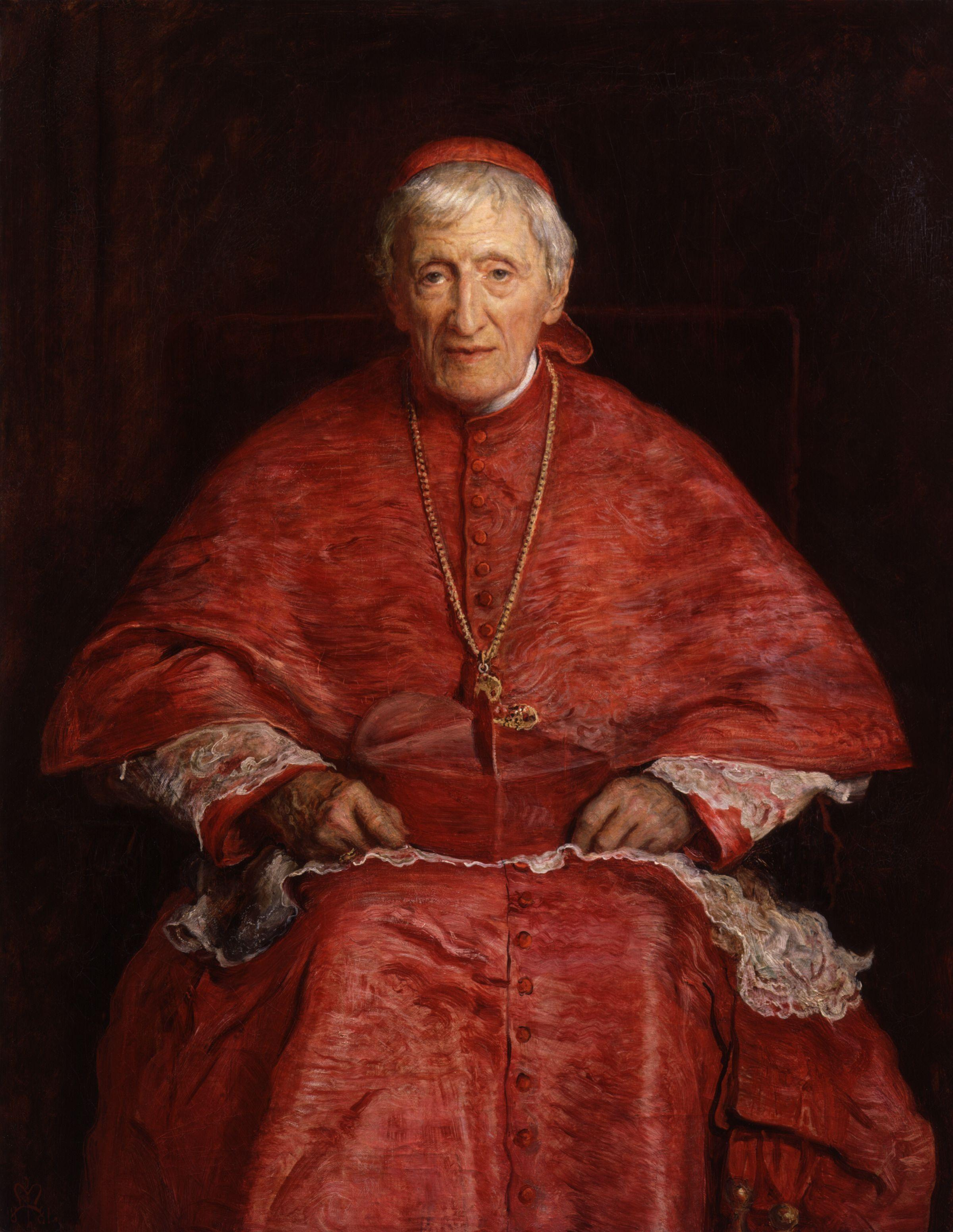Editorial Verbo. 1974, pág. 276
John Henry Newman frases e citações
for nothing would be done at all, if a man waited till he could do it so well, that no one could find fault with it.
"Lectures on the present position of Catholics in England: Addressed to the Brothers of the Oratory" - Página 371 http://books.google.com.br/books?id=ScEHAAAAQAAJ&pg=PA371, de John Henry Newman - Publicado por James Duffy, 1857 - 376 páginas
John Henry Newman: Frases em inglês
“Growth is the only evidence of life.”
Apologia pro Vita Sua http://www.fordham.edu/halsall/mod/newman/apologia1.html (1864).
“To live is to change, and to be perfect is to have changed often.”
Variante: In a higher world it is otherwise, but here below to live is to change, and to be perfect is to have changed often.
Fonte: An Essay on the Development of Christian Doctrine (1845), Chapter 1, Section 1, Part 7.
Tract 83 http://anglicanhistory.org/tracts/tract83.html (29 June 1838).
To Richard Hurrell Froude, August 23, 1835.
Letters and Correspondence of John Henry Newman During His Life in the English Church, 1890, Anne Mozley, ed., Longmans’s Green & Co., London, New York, Volume 2, p. 113. http://books.google.com/books?id=uak8AAAAYAAJ&pg=PA113&dq=%22the+more+i+read+of+athanasius,+theodoret%22&hl=en&ei=CeBlTqH1K4m2sQL91pm3Cg&sa=X&oi=book_result&ct=result&resnum=2&ved=0CC8Q6AEwAQ#v=onepage&q=%22the%20more%20i%20read%20of%20athanasius%2C%20theodoret%22&f=false
Contexto: The more I read of Athanasius, Theodoret, etc, the more I see that the ancients did make the Scriptures the basis of their belief. The only question is, would they have done so in another point besides the θεολογία (theology), etc, which happened in the early ages to be in discussion? I incline to say the Creed is the faith necessary to salvation, as well as to Church communion, and to maintain that Scripture, according to the Fathers, is the authentic record and document of this faith.
It surely is reasonable that 'necessary to salvation' should apply to the Baptismal Creed: 'In the name of,' etc (vid. He who believeth etc.). Now the Apostles' Creed is nothing but this; for the Holy Catholic Church, etc [in it] are but the medium through which God comes to us. Now this θεολογία, I say, the Fathers do certainly rest on Scripture, as upon two tables of stone. I am surprised more and more to see how entirely they fall into Hawkins’s theory even in set words, that Scripture proves and the Church teaches. http://books.google.com/books?id=JbwJVBOvECwC&pg=PA66&dq=%22that+the+sacred+text+was+never+intended+to+teach+doctrine,+but+only+to+prove+it%22&hl=en&ei=k-RlTq__FOStsQKOwrCzCg&sa=X&oi=book_result&ct=result&resnum=3&ved=0CDMQ6AEwAg#v=onepage&q=%22that%20the%20sacred%20text%20was%20never%20intended%20to%20teach%20doctrine%2C%20but%20only%20to%20prove%20it%22&f=false
I believe it would be extremely difficult to show that tradition is ever considered by them (in matters of faith) more than interpretative of Scripture. It seems that when a heresy rose they said at once ‘That is not according to the Church's teaching,’ i. e. they decided it by the praejudicium [N. B. prescription] of authority.
Again, when they met together in council, they brought the witness of tradition as a matter of fact, but when they discussed the matter in council, cleared their views, etc., proved their power, they always went to Scripture alone. They never said 'It must be so and so, because St. Cyrian says this, St. Clement explains in his third book of the "Paedagogue," etc.' and with reason; for the Fathers are a witness only as one voice, not in individual instances, or, much less, isolated passages, but every word of Scripture is inspired and available.
“We can believe what we choose. We are answerable for what we choose to believe.”
Letter to Mrs William Froude, 27 June 1848.
Lecture IX
Lectures on the Present Position of Catholics in England (1851)
“A great memory does not make a philosopher, any more than a dictionary can be called grammar.”
Discourse VIII, pt. 10.
The Idea of a University (1873)
“To be deep in history is to cease to be a Protestant.”
Introduction, Part 5.
An Essay on the Development of Christian Doctrine (1845)
Lecture I, Section 1.
Lectures on the Present Position of Catholics in England (1851)
“Where good and ill together blent,
Wage an undying strife.”
A Martyr Convert http://www.newmanreader.org/works/verses/verse170.html, st. 3 (1856). Also in Callista Chapter 36 http://www.newmanreader.org/works/callista/chapter36.html (1855).
“It is thy very energy of thought
Which keeps thee from thy God.”
The Dream of Gerontius http://www.ccel.org/n/newman/gerontius/gerontius.htm, Pt. III (1866).
Apologia Pro Vita Sua [A defense of one's own life] (1864)
“The world is content with setting right the surface of things.”
Discourse VIII, pt. 8.
The Idea of a University (1873)
“As I have already said, there are but two alternatives, the way to Rome, and the way to Atheism.”
Apologia Pro Vita Sua [A defense of one's own life] (1864)
“Christian! hence learn to do thy part,
And leave the rest to Heaven.”
St. Paul at Melita http://www.newmanreader.org/works/verses/verse70.html, st. 3 (1833).
Apologia Pro Vita Sua [A defense of one's own life] (1864)
“So living Nature, not dull Art,
Shall plan my ways and rule my heart.”
Nature and Art http://www.newmanreader.org/works/verses/verse5.html, st. 12 (1868).
“From shadows and symbols into the truth!”
Ex umbris et imaginibus in veritatem!
His own epitaph at Edgbaston
The Dream of Gerontius http://www.ccel.org/n/newman/gerontius/gerontius.htm, Pt. I (1866).
Solitude http://www.newmanreader.org/works/verses/verse1.html (1818).
The Pillar of the Cloud http://www.bartleby.com/236/75.html, st. 1 (1833).
Discourse V, pt. 9.
The Idea of a University (1873)
Sermon 20 http://www.newmanreader.org/works/subjects/sermon20.html (1834).
Apologia Pro Vita Sua [A defense of one's own life] (1864)
“It is almost a definition of a gentleman to say he is one who never inflicts pain.”
Discourse VIII, pt. 10. http://books.google.com/books?id=YdrJkVPhptwC&q=%22it+is+Almost+a%22+%22a+gentle+man+to+say+he+is+one+who+never+inflicts+pain%22&pg=PA208#v=onepage
The Idea of a University (1873)
Parochial and Plain Sermons, London, 1868; quoted in Matthew Scully, [//books.google.it/books?id=SYY7AAAAQBAJ&pg=PT30 Dominion] (2002).
